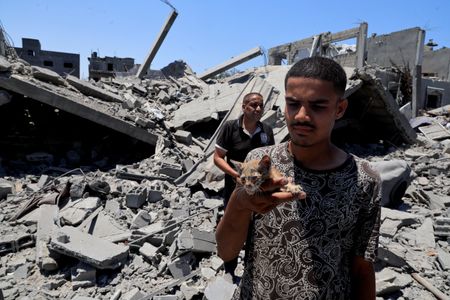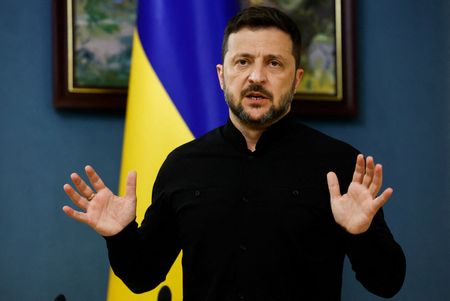JERUSALEM/WASHINGTON/CAIRO (Reuters) -Israeli Prime Minister Benjamin Netanyahu and U.S. President Donald Trump appeared on Friday to abandon Gaza ceasefire negotiations with Hamas, both saying it had become clear that the Palestinian militants did not want a deal.
Netanyahu said Israel was now mulling “alternative” options to achieve its goals of bringing its hostages home from Gaza and ending Hamas rule in the enclave, where starvation is spreading and most of the population is homeless amid widespread ruin.
Trump said he believed Hamas leaders would now be “hunted down”, telling reporters: “Hamas really didn’t want to make a deal. I think they want to die. And it’s very bad. And it got to be to a point where you’re going to have to finish the job.”
The remarks appeared to leave little to no room, at least in the short term, to resume negotiations for a break in the fighting, at a time when international concern is mounting over worsening hunger in war-shattered Gaza.
French President Emmanuel Macron, responding to the deteriorating humanitarian situation, announced that Paris would become the first major Western power to recognise an independent Palestinian state.
Britain and Germany said they were not yet ready to do so but later joined France in calling for an immediate ceasefire. British Prime Minister Keith Starmer said his government would recognize a Palestinian state only as part of a negotiated peace deal.
Trump dismissed Macron’s move. “What he says doesn’t matter,” he said. “He’s a very good guy. I like him, but that statement doesn’t carry weight.”
Israel and the United States withdrew their delegations on Thursday from the ceasefire talks in Qatar, hours after Hamas submitted its response to a truce proposal.
Sources initially said on Thursday that the Israeli withdrawal was only for consultations and did not necessarily mean the talks had reached a crisis. But Netanyahu’s remarks suggested Israel’s position had hardened overnight.
U.S. envoy Steve Witkoff said Hamas was to blame for the impasse, and Netanyahu said Witkoff had got it right.
Senior Hamas official Basem Naim said on Facebook that the talks had been constructive, and criticised Witkoff’s remarks as aimed at exerting pressure on Israel’s behalf.
“What we have presented – with full awareness and understanding of the complexity of the situation – we believe could lead to a deal if the enemy had the will to reach one,” he said.
Mediators Qatar and Egypt said there had been some progress in the latest round of talks. They said suspensions were a normal part of the process and they were committed to continuing to try to reach a ceasefire in partnership with the U.S.
The proposed ceasefire would suspend fighting for 60 days, allow more aid into Gaza, and free some of the 50 remaining hostages held by militants in return for Palestinian prisoners jailed in Israel.
It has been held up by disagreement over how far Israel should withdraw its troops and the future beyond the 60 days if no permanent agreement is reached.
Itamar Ben-Gvir, the far-right national security minister in Netanyahu’s coalition, welcomed Netanyahu’s step, calling for a total halt of aid to Gaza and complete conquest of the enclave, adding in a post on X: “Total annihilation of Hamas, encourage emigration, (Jewish) settlement.”
MASS HUNGER
International aid organisations say mass hunger has now arrived among Gaza’s 2.2 million people, with stocks running out after Israel cut off all supplies to the territory in March, then reopened it in May but with new restrictions.
The Israeli military said on Friday it had agreed to let countries airdrop aid into Gaza. Hamas dismissed this as a stunt.
“The Gaza Strip does not need flying aerobatics, it needs an open humanitarian corridor and a steady daily flow of aid trucks to save what remains of the lives of besieged, starving civilians,” Ismail Al-Thawabta, director of the Hamas-run Gaza government media office, told Reuters.
Gaza medical authorities said nine more Palestinians had died over the past 24 hours from malnutrition or starvation. Dozens have died in the past few weeks as hunger worsens.
Israel says it has let enough food into Gaza and accuses the United Nations of failing to distribute it, in what the Israeli foreign ministry called on Friday “a deliberate ploy to defame Israel”. The United Nations says it is operating as effectively as possible under Israeli restrictions.
United Nations agencies said on Friday that supplies were running out in Gaza of specialised therapeutic food to save the lives of children suffering from severe acute malnutrition.
United Nations aid chief Tom Fletcher also has demanded that Israel provide evidence for its accusations that staff with the U.N. Office for the Coordination of Humanitarian Affairs were affiliated with Hamas, according to a letter seen by Reuters.
The ceasefire talks have been accompanied by continuing Israeli offensives. Palestinian health officials said Israeli airstrikes and gunfire had killed at least 21 people across the enclave on Friday, including five killed in a strike on a school sheltering displaced families in Gaza City.
In the city, residents carried the body of journalist Adam Abu Harbid through the streets wrapped in a white shroud, his blue flak jacket marked PRESS draped across his body. He was killed overnight in a strike on tents housing displaced people.
Mahmoud Awadia, another journalist attending the funeral, said the Israelis were deliberately trying to kill reporters. Israel denies intentionally targeting journalists.
Israel launched its assault on Gaza after Hamas-led fighters stormed Israeli towns near the border, killing some 1,200 people and capturing 251 hostages on October 7, 2023. Since then, Israeli forces have killed nearly 60,000 people in Gaza, health officials there say, and reduced much of the enclave to ruins.
(Reporting by Maayan Lubell in Jerusalem, Steve Holland in Washington and Nidal al-Mughrabi in Cairo; writing by Peter Graff, Mark Heinrich and Patricia Zengerle; editing by Alison Williams, Toby Chopra, Philippa Fletcher)











